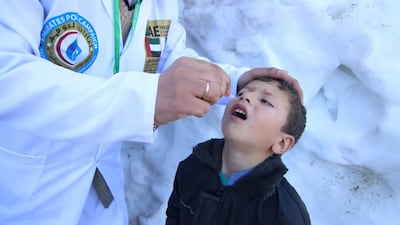DUBAI // This year could be a landmark in the UAE’s combined effort with the Bill and Melinda Gates Foundation to eradicate polio.
Development experts on a panel at a Dubai aid and development conference on Wednesday discussed the latest collaboration between the foundation and the UAE, ahead of the 2016 polio campaign launch.
Sitting on the panel was Hassan Al Damluji, head of Middle East relations at the foundation, who said mass migration around the region has made the foundation’s work considerably harder but that he was confident that polio would be wiped out this year.
“In 2014, there were 350 cases, last year there were just 74 polio cases in the world,” he said. “There is a unique opportunity in 2016 to finish this disease, and the UAE will announce its part in that campaign in the next few weeks.
“If polio has nowhere to go, it dies. It’s all about the vaccination programme, but the donor commitment in the UAE has been hugely important.
“As a foundation that focuses on long-term development, to make sustainable improvements, it is much harder to do the work with the conflict and mass migration that is continuing in this region.”
The foundation has funded sanitation projects and eco-toilets, some developed in the Gulf via a UAE-based businessman, Dr Siddeek Ahmed, and Eram Scientific.
The company has been working in the field of community hygiene and sanitation and received the Bill and Melinda Gates Foundation grant for the Reinvent the Toilet Challenge. Eram researched toilet hygiene, non-depletion of water resources and energy conservation solutions.
Those solutions could be used in refugee camps in Jordan and Lebanon this year.
The foundation has set aside US$400 million (Dh1.47 billion) for projects starting this year in 31 countries, many of which are in health and agriculture and include malaria operations in sub-Saharan Africa.
Panellist Dr Valerie Nkamgang Bemo, from the foundation’s emergency response team, said investing in innovation was crucial.
“The foundation supports innovation to improve lives, such as better sanitation in refugee camps in Jordan and Lebanon,” she said. “Sanitation is a big issue for refugees. Projects include using excess methane to power generators and the latest technology to transform sludge and waste into clean water.
“The amount of people in these areas puts huge pressure on existing facilities.”
nwebster@thenational.ae


